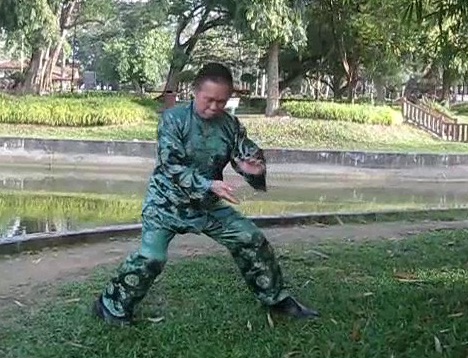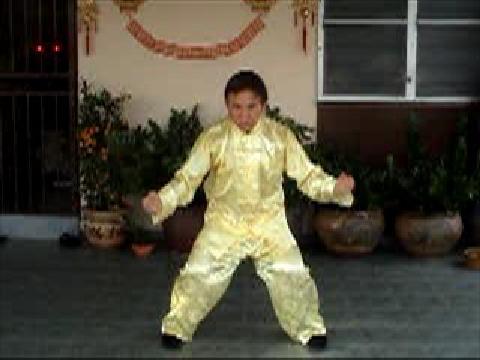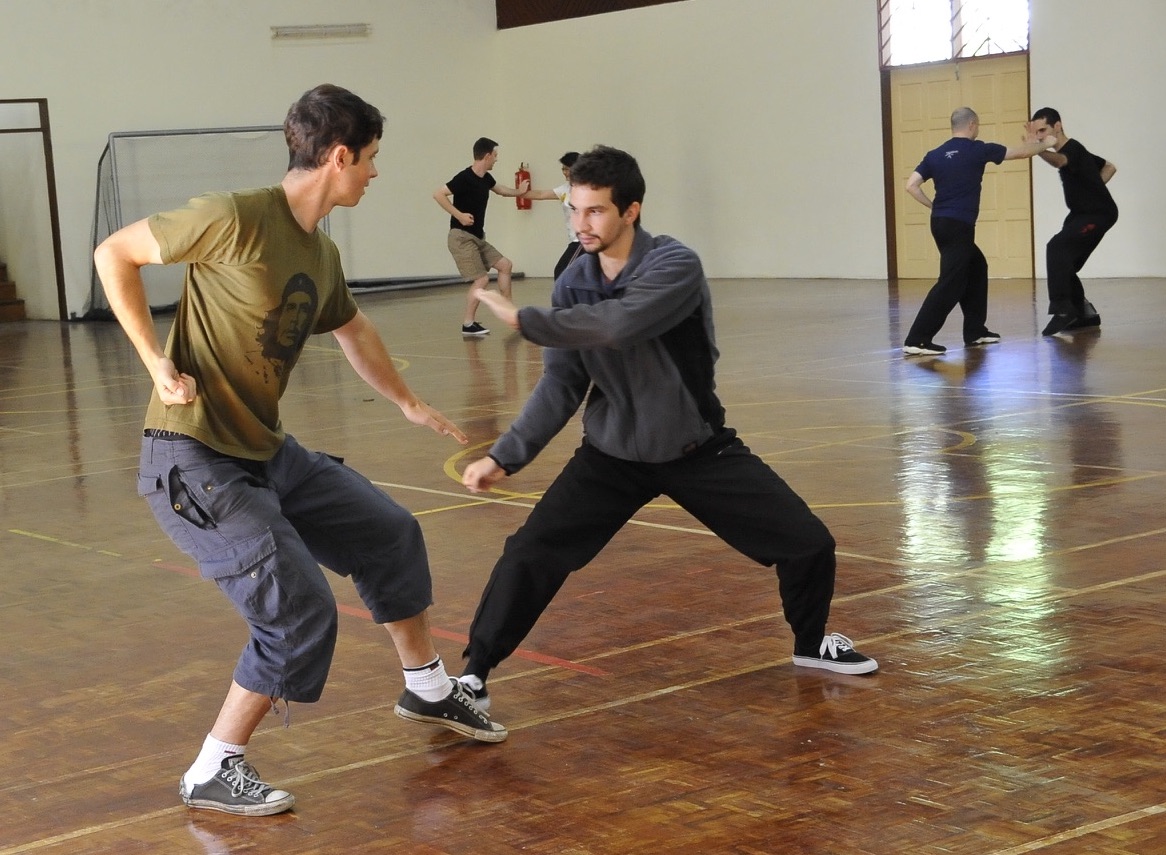SELECTION OF QUESTIONS AND ANSWERS
DECEMBER 2016 PART 2

The flowing force of Tai Chi Chuan
Question 1
What is the difference between spiritual cultivation and morality, and between spiritual cultivation and religious education?
— Abram, New Zealand
Answer
Spiritual cultivation is cultivating the spirit. Morality is practicing high moral values. Religious education is being knowledgeable in religions matters.
They are all different, though related; just as an orange is different from an apple, and an apple is different from a pear, though they are all fruit. Many people, however, do not realise the difference between spiritual cultivation, morality and religious education, though they can tell the difference amongst an orange, an apple and a pear.
Some people may be highly cultivated in spirit, but lack morality and may not believe in a religion. Black magicians are examples of highly cultivated in spirit but lack morality, and even if they believe in a religion they do not practice it, as all religions teach people to do good. Asuaras, who are powerful supernatural beings, are highly cultivated in spirit but lacking in morality and do not practice the good teaching of religion.
Some people with high moral values, like they are compassionate and caring, but may not be spiritually cultivated. For example, they are afraid of ghosts, which show that their spirit is week. They are usually religions, from whose teaching they develop high morals, but some may not believe in any religion.
Some who know a lot about religion may not be spiritually cultivated. They are depressed, for example, which shows that their spirit is not high. Some may use religion to cause harm to society.
Nevertheless, highly spiritually cultivated persons usually have high morals. Not only they know much about religion, they celebrate with followers of other religions.
Question 2
Does hard force always come in pair with consolidation and soft force always with flow?
I have often read about the force from Tai Chi Chuan being "soft and flowing" and the force from Iron Wire being "hard and consolidated", but are other combinations (i.e. "hard and flowing") also existing?
— Sifu Leonard Lackinger, Austria
Answer
Yours and similar questions will become clearer and meaningful when we remember that chi kung and kungfu terms are for convenience, and often arbitrary. They are unlike scientific terms which are definitive and exact.
Sodium chloride, for example, is always sodium chloride. It cannot be something else. But hard force or soft soft can be consolidated, flowing or both, or none of these features.
For our convenience, we say that a force is hard or soft depending on the proportion of consolidation or flowing. If there is more consolidation than flowing, we say the force is hard. If there is more flowing than consolidation, we say the force is soft.
Iron Wire is a good example of hard force as there is, generally, about 90% consolidation and 10% flowing. Taijiquan force from Yang Style is a good example of soft force as there is, generally, about 90% flowing and 10% consolidation.
Some types of force, like that from Flower Set and Wudang Taijiquan, may defy this classification of convenience because the difference between consolidation and flowing is not much.
This classification of convenience gives us both better understanding and many benefits. We understand, for example, as you have clearly explained in your article, that both flowing and consolidation are required in soft force and hard force; it is the difference in their proportion that defines their grouping. This understanding is of much significance. Not only it makes us very cost-effective in our training, it also avoids possible deviation.
Most practitioners merely practice the required techniques and a very small percentage of them eventually attain the force after many years. But with this understanding, our students can attain in one month what others would need a year. Many people may find this hard to believe, but, as you know well, it is true.
In their training many practitioners tense their muscles, mistaking tension for consolidation. They lock up their energy, resulting in big muscles which give them physical strength, but not internal force. Worse, and without their knowing, the stagnant energy is detrimental to their health, vitality and longevity.
Not only we are cost-effective in developing the required force, we can also vary the proportion of flowing and consolidating for our special purpose. Although the usual proportion of consolidation and flowing in Iron Wire is 90-10, we can, for the purpose of health and vitality for example, have more flow, like 60-40. Although the usual proportion of consolidation and flowing in Yang Style Taijiquan is 10-90. we may have more consolidation, like 30-70, for combat.
Hence, while the combinations of "soft and flowing" and "hard and consolidated" are common, other combinations are also possible. We may have "hard and flowing", like the Iron Wire force in Barcelona, and "soft and consolidated", like the Taijiquan force in Ireland.
As stated above, this classification of force into hard and soft, or into consolidated and flowing, is for our convenience and benefit. Other schools, or we ourselves in special situations, may use different criteria for the classification.
Another common pair of criteria is external and internal. If you strike a sandbag or roll your arm over bamboo, you develop Iron Fist or Iron Arm using external methods. If you practice 30 punches using stone-locks or Green Dragon Separating Water, you develop Iron Fist or Iron Arm using internal methods.
It is commonly believed that if you use external methods, you develop external force, and that internal force can only be developed via internal methods. But this is not necessarily, though usually, true. Rolling your arm over bamboo can develop much internal force, but the method is external. Remember that these are not scientific terms, but established terms for convenience.

The consolidated force of Iron Wire
Question 3
I am a faithful follower of your website and know the many benefits learning from you. I would like to learn Shaolin Kungfu from you, but I do not have any prior kungfu experience. There are some martial art schools in my area, but no kungfu schools. What is your advice?
— Adrain, Belgium
Answer
My advice is to learn from my books and videos on my website about basic stances and basic patterns, and attend my Intensive Shaolin Kungfu Course. I offer this course only once, and sometimes twice, a year. Please check my website for available dates.
It is important that you continue to practice what you have learnt at the course. If you can, it is recommended that y0u join a regular class taught by one of our certified instructors. My intensive courses as well as my regional courses and regular classes complement one another, though the learning material may not be the same.
In other words, those who have attended my intensive courses or my regional courses, which take only a few days per course, will benefit more if they also join regular classes taught by our certified instructors, which take a few months per class, than those who do not join regular classes. On the other hand, those who attend regular classes will benefit more if they also attend my intensive courses and regional courses than those who do not attend.
Many students have benefited much in this way. Some have progressed to become certified instructors.
Question 4
Can I learn from a Karate school or a MMA school in my area before I attend your Intensive Shaolin Kungfu Course?
Answer
I used to tell those without prior kungfu experience who wish to attend my Intensive Shaolin Kungfu Course or Intensive Taijiquan Course to learn basic kungfu (including Taijiquan) elsewhere before attending my course. If they cannot find any kungfu schools to learn first, they can learn from other martial art schools.
However, I discovered from experience that those who first learned other martial arts as well as some who learned kungfu from schools that used other martial arts or random fighting in free sparring, had difficulty relaxing and often were injured. Hence, I have modified my advice.
As preparation to attend my my intensive kungfu courses, you can learn from other martial art schools or other kungfu schools, but do not involve yourself in free sparring, which is virtually free exchange of blows, and do not tense yourself when learning the stances and basic patterns. However, this may not be easy. Not only students have to learn what is being taught, instead of choosing what to learn in a class, they also lack the knowledge and experience to decide what they should or should not learn.
Moreover, I hesitate to recommend this, as I feel it is unfair to the schools involved. Hence, now I recommend that such intending students learn from my books and videos as best as they can.
My books are comprehensive and my videos extensive. You need to learn only a very small portion from my books and videos. From my three Shaolin Kungfu books, "The Art of Shaolin Kung Fu", "Introduction to Shaolin Kungfu", and "The Complete Book of Shaolin", you only need to learn the basic stances and basic patterns. You don't have to worry about other parts of the book, though you may read them for pleasure and information.
Similarly, from my videos in my website you need only learn the basic stances and basic patterns. The following are recommended:
- Developing Internal Force and Mental Clarity
- Two Crucial Stages in Stance Training
- The Basics
- Bssics of Shaolin Kungfu Training

An Intensive Shaolin Kungfu Course in Sabah
Question 5
My grandfather passed away. My heart knows that his spirit or soul never dies and that he is being guided by Buddhas and Bodhisattvas. but the human part of me is a little emotionally confused.
— Parveen, UK
Answer
Yes, the spirit or soul never dies. Until the personal spirit returns to the Universal Spirit, death is just a change of existence.
Question 6
Sifu, what prayers would you recommend I recite to help him be reborn into a better life? For how long?
Answer
You can recite any suitable prayers according to the person's religion or according to your religion.
A highly recommended prayer is to ask the Divine to enable the spirit to be reborn at a happier place than the one he left. A highly recommended mantra is the Amitabha mantra, i.e. Namo Amitabha Buddha, repeated many times.
There is no definite time frame for prayers and mantras. You can pray or recite as long or as briefly as you wish. The crucial point is sincerity. A short sincere prayer or recitation is better than a long insincere one.

False-Leg Stance
Question 7
How can we better understand or prepare for death and losing our loved ones?
Answer
A good way to understand death is to realize that it is one of countless stages in birth and rebirth until the personal spirit is ready to return to the Universal Spirit. Death is not the end of everything. It is a transition from one life to another life. If a person's karma is good, he will be reborn at a higher station in life..
A good way to prepare for the eventuality of death in this life is to live this life honorably in a way the Divine will be proud of us. This does not necessary mean that one has to be a puritan in his religion.
Question 8
Is it best to mourn with family and attend funerals or stay detached/think loving thoughts?
Answer
When we understand the truth about death, it is better to stay detached and think of loving thoughts. However, this is a minority opinion, as not many people understand this philosophy. Indeed, other people may be offended by this opinion. The majority opinion is to mourn with the family, and become sad.
When Chuang Tue, a great Taoist sage, lost his wife, he played his drum and sang. Other people though that he had gone mad. Some people asked him whether he was sad that his wife was dead. Chuang Tzu replied that it was silly to be sad because his wife was now free, having been released from the bound of suffering in the physical world.
Unless one has reached the attainment of Chuang Tzu, he should not exhibit happiness when a loved ones has passed away. Doing so would be inconsiderate to others who have not reached this level of understanding. But if he knows the truth about death, he would know that the spirit which was previously bound to his physical body is now set free.
LINKS
Selected Reading
- Ove-Training and How to Deal with It
- Two Great Realizations
- Counter against Thrust Kick When Both Hands are Held
- Shaolin 36 Leg Techniques
- Kungfu Training
